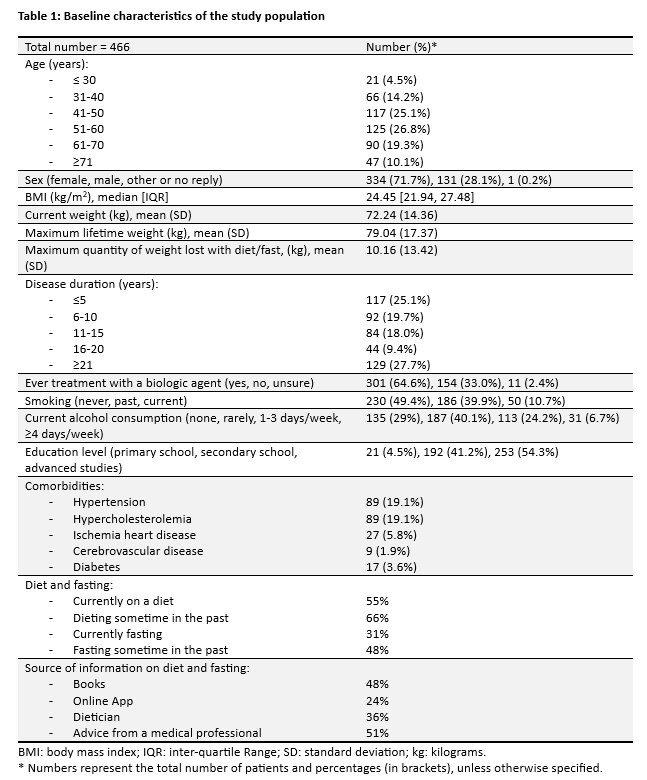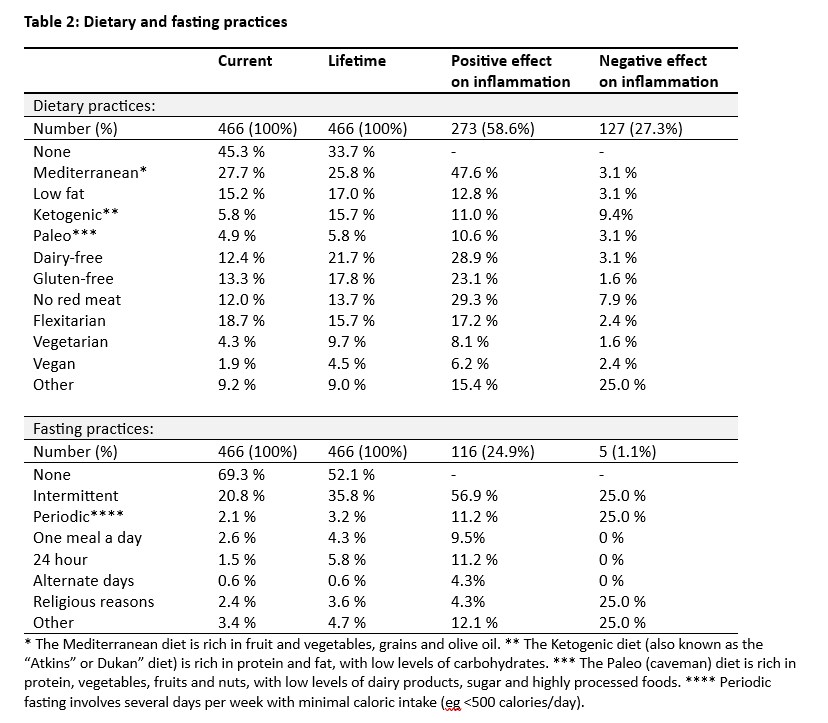Session Information
Session Type: Poster Session B
Session Time: 10:30AM-12:30PM
Background/Purpose: Current EULAR recommendations highlight the importance of a healthy, balanced diet in patients with inflammatory rheumatic disease, including axial spondylarthritis (axSpA). A Mediterranean-style diet is generally suggested, although the literature is non-conclusive. Small observational studies in rheumatoid arthritis have suggested that Ramadan fasting results in significantly lower disease activity scores. However, there is very limited data regarding the practice of fasting, such as intermittent fasting (IF) and types of diets in axSpA patients and their effects on disease activity.
Methods: We explored diet and fasting practices and their perceived effects on disease activity in patients with axSpA across Switzerland with the DaFiS (Diet and Fasting in SpA) questionnaire, which assessed knowledge, attitudes, and practices (duration ~10 minutes). The survey was distributed to members of the Swiss axSpA patient association (https://bechterew.ch/) via email and a member newsletter, providing a link and QR code to the online REDCap form.
Results: Of the 466 respondents, the majority were female (72%) and more than half were aged between 41 and 60 years. Median (IQR) body mass index (BMI) was 24.5 (21.9, 27.5) kg/m2. Two-thirds of patients described past/present treatment with a biological agent. Most respondents were following some sort of diet, currently (55%) or in the past (66%), and many were undertaking some form of fasting, currently (31%) or in the past (48%). (Table 1).
Those currently dieting were predominantly younger (p=0.006), with shorter disease duration (p=0.03), women (41% vs. 33% men, p=0.09), and consumed less alcohol (p=0.01). BMI tended to be lower in dieters (23.9 vs. 24.8 kg/m2, p=0.06). The most common dietary approaches were: Mediterranean (51%), flexitarian (34%), gluten-free (24%), dairy-free (23%) and no red meat (22%).
Patients currently fasting tended to be more often women (29% vs. 24% males, p=0.09) and to present more hypercholesterolemia (26% vs. 17%, p=0.04). The most common fasting approach was IF (74%), one-meal-a-day (9%), or for religious raisons (7%).
While 59% felt that dietary practices could improve the inflammatory activity of their disease, 27% felt that certain diets could worsen inflammatory activity. Whereas 25% felt that fasting (mainly IF) could improve the inflammatory activity of their axSpA, 18% felt that fasting had led to a reduced requirement for treatment of their axSpA, whereas only 1% reported a deleterious effect on inflammation. (Table 2). If fasting was demonstrated to be effective for disease management in axSpA, 77% stated that they would agree to try the practice.
Conclusion: In this axSpA cohort of predominantly female patients, with a median BMI in the normal range, a large proportion were currently on some form of diet or fasting behavior. Almost 50% of patients felt that the Mediterranean diet had beneficial effects on the inflammatory activity of their disease, while 57% that had tried intermittent fasting felt that it was beneficial. These findings provide encouraging signs that many patients are willing to adhere to dietary modification and to practice fasting, to complement routine care.
To cite this abstract in AMA style:
Nissen M, Ciurea A, Micheroli R, Trunk E, Courvoisier D. Dietary Modification and Intermittent Fasting Are Common in Patients with Axial Spondylarthritis and May Lead to Reduced Inflammatory Activity [abstract]. Arthritis Rheumatol. 2024; 76 (suppl 9). https://acrabstracts.org/abstract/dietary-modification-and-intermittent-fasting-are-common-in-patients-with-axial-spondylarthritis-and-may-lead-to-reduced-inflammatory-activity/. Accessed .« Back to ACR Convergence 2024
ACR Meeting Abstracts - https://acrabstracts.org/abstract/dietary-modification-and-intermittent-fasting-are-common-in-patients-with-axial-spondylarthritis-and-may-lead-to-reduced-inflammatory-activity/


